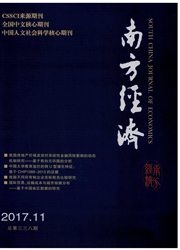

 中文摘要:
中文摘要:
本文运用苏北农村农户层面的微观数据,并结合农业生产和农户家庭特征,来估计农民的教育回报率。农户以家庭为单位进行联合劳动的特征导致农户收入贡献的不可分性以及家庭内教育投资具有正的外部性,使得个人教育投资回报小于家庭回报。然而,由于家庭内部更多成员的教育投资的外部性具有递减的特征以及婚姻市场存在的匹配现象,可能会出现由知识拥挤带来的教育投资过度问题。本文的实证分析表明:农户家庭内成员的教育投资的确存在外部性;教育投资回报会随着受教育人数的增加而减少;农村婚姻中存在教育匹配效应;户主配偶的教育投资存在动态不足。
 英文摘要:
英文摘要:
This paper uses the micro-data of north rural of Jiangsu province, combining with characteristics in agricultural production and peasant's family, to calculate the returns of education investment on the whole family's income. The intrahousehold externality of education caused by the facts of un-separabilities in agricultural production leads to a larger return of single member's education on household income. The externalities, together with marriage match in education, however, decrease the return as the number of household member investing in education increases, which may result in "literacy congestion" or over-investment in education. The empirical investigation shows that education does cause literacy externality among family members and marriage matching does exist. Additionally, education return exhibits non-linear features. Contrary to our theoretical hypothesis, there are dynamic under-investments in education.
 同期刊论文项目
同期刊论文项目
 同项目期刊论文
同项目期刊论文
 期刊信息
期刊信息
